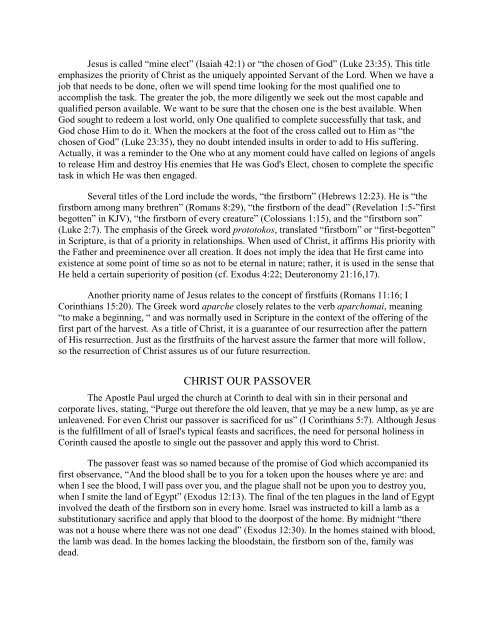The Names of Jesus - Elmer Towns
The Names of Jesus - Elmer Towns
The Names of Jesus - Elmer Towns
- TAGS
- elmer
- towns
- elmertowns.com
Create successful ePaper yourself
Turn your PDF publications into a flip-book with our unique Google optimized e-Paper software.
<strong>Jesus</strong> is called “mine elect” (Isaiah 42:1) or “the chosen <strong>of</strong> God” (Luke 23:35). This title<br />
emphasizes the priority <strong>of</strong> Christ as the uniquely appointed Servant <strong>of</strong> the Lord. When we have a<br />
job that needs to be done, <strong>of</strong>ten we will spend time looking for the most qualified one to<br />
accomplish the task. <strong>The</strong> greater the job, the more diligently we seek out the most capable and<br />
qualified person available. We want to be sure that the chosen one is the best available. When<br />
God sought to redeem a lost world, only One qualified to complete successfully that task, and<br />
God chose Him to do it. When the mockers at the foot <strong>of</strong> the cross called out to Him as “the<br />
chosen <strong>of</strong> God” (Luke 23:35), they no doubt intended insults in order to add to His suffering.<br />
Actually, it was a reminder to the One who at any moment could have called on legions <strong>of</strong> angels<br />
to release Him and destroy His enemies that He was God's Elect, chosen to complete the specific<br />
task in which He was then engaged.<br />
Several titles <strong>of</strong> the Lord include the words, “the firstborn” (Hebrews 12:23). He is “the<br />
firstborn among many brethren” (Romans 8:29), “the firstborn <strong>of</strong> the dead” (Revelation 1:5-”first<br />
begotten” in KJV), “the firstborn <strong>of</strong> every creature” (Colossians 1:15), and the “firstborn son”<br />
(Luke 2:7). <strong>The</strong> emphasis <strong>of</strong> the Greek word prototokos, translated “firstborn” or “first-begotten”<br />
in Scripture, is that <strong>of</strong> a priority in relationships. When used <strong>of</strong> Christ, it affirms His priority with<br />
the Father and preeminence over all creation. It does not imply the idea that He first came into<br />
existence at some point <strong>of</strong> time so as not to be eternal in nature; rather, it is used in the sense that<br />
He held a certain superiority <strong>of</strong> position (cf. Exodus 4:22; Deuteronomy 21:16,17).<br />
Another priority name <strong>of</strong> <strong>Jesus</strong> relates to the concept <strong>of</strong> firstfuits (Romans 11:16; I<br />
Corinthians 15:20). <strong>The</strong> Greek word aparche closely relates to the verb aparchomai, meaning<br />
“to make a beginning, “ and was normally used in Scripture in the context <strong>of</strong> the <strong>of</strong>fering <strong>of</strong> the<br />
first part <strong>of</strong> the harvest. As a title <strong>of</strong> Christ, it is a guarantee <strong>of</strong> our resurrection after the pattern<br />
<strong>of</strong> His resurrection. Just as the firstfruits <strong>of</strong> the harvest assure the farmer that more will follow,<br />
so the resurrection <strong>of</strong> Christ assures us <strong>of</strong> our future resurrection.<br />
CHRIST OUR PASSOVER<br />
<strong>The</strong> Apostle Paul urged the church at Corinth to deal with sin in their personal and<br />
corporate lives, stating, “Purge out therefore the old leaven, that ye may be a new lump, as ye are<br />
unleavened. For even Christ our passover is sacrificed for us” (I Corinthians 5:7). Although <strong>Jesus</strong><br />
is the fulfillment <strong>of</strong> all <strong>of</strong> Israel's typical feasts and sacrifices, the need for personal holiness in<br />
Corinth caused the apostle to single out the passover and apply this word to Christ.<br />
<strong>The</strong> passover feast was so named because <strong>of</strong> the promise <strong>of</strong> God which accompanied its<br />
first observance, “And the blood shall be to you for a token upon the houses where ye are: and<br />
when I see the blood, I will pass over you, and the plague shall not be upon you to destroy you,<br />
when I smite the land <strong>of</strong> Egypt” (Exodus 12:13). <strong>The</strong> final <strong>of</strong> the ten plagues in the land <strong>of</strong> Egypt<br />
involved the death <strong>of</strong> the firstborn son in every home. Israel was instructed to kill a lamb as a<br />
substitutionary sacrifice and apply that blood to the doorpost <strong>of</strong> the home. By midnight “there<br />
was not a house where there was not one dead” (Exodus 12:30). In the homes stained with blood,<br />
the lamb was dead. In the homes lacking the bloodstain, the firstborn son <strong>of</strong> the, family was<br />
dead.
















